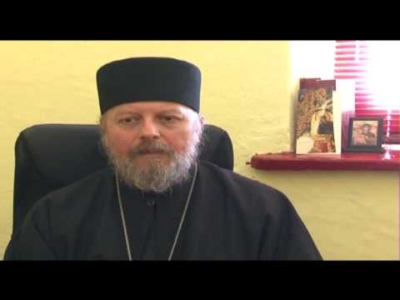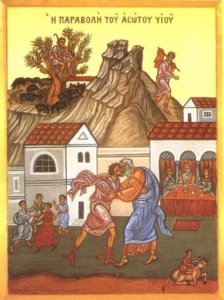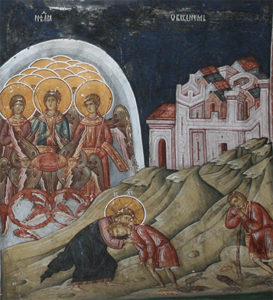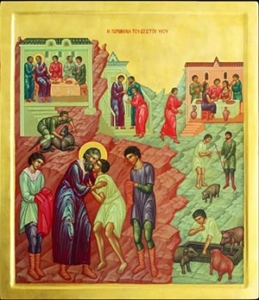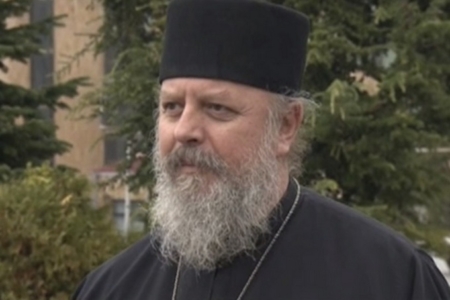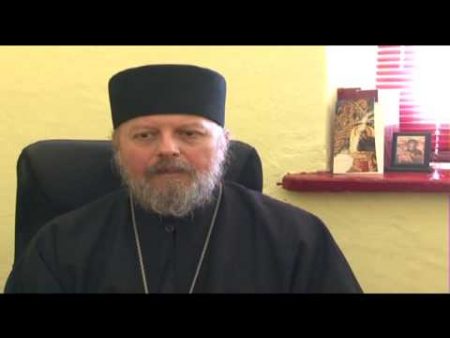
Refer to: Luke 15, 11-32
In the younger son, we notice the freedom and the awareness with which he addresses his Heavenly Father and that he seeks something that he feels naturally belongs to him, but also we notice that he obviously does not understand the very nature of the “livelihood” whose division he requires. It is the fullness of God’s grace, which we all receive in our hearts on the day of the Holy Baptism; which, because of the multitude of those who receive it, neither increases, nor for the same reason decreases; which also cannot be divided nor multiplied.
God, our Heavenly Father to each one of us equally, without a word being said and without condition, gives us the fullness of His grace. It is from us alone and from our free will which determines, how we would behave towards this grace, how and when, how much and if we would use it. God’s concern only is not to disturb our freedom, and thus our mutual relationship: Parent – child. We have nothing more holy than this relationship! This relationship is the only hope for our salvation!
The demon does not incite us to do evil and sin all at once, but gradually, because if he reveals his ultimate goal from the beginning, he will surely scare us and turn us away from sin. The demon first urges the younger son to seek and appropriate a “part” of what is not divisible and which cannot be appropriated only to himself, and then, on the basis of the established and accepted thought that “he has something “, he is alluring (tricks) him to decide on independent and self-sufficient life. Is it not that all of this reminds you of those who abuse the viewing of the first light, and who think that they have attained enlightenment of the mind and that they know something and they can do something, decide to spiritually self-govern, and even worse than this, they decide to lead others? Yes, that’s exactly what it is! Children, remember: “Enlightenment is not mere knowledge that is proud, it is, above all, the power and authority of the mind, on the word and on the deeds, that means, on the overall presence.”
Why it is a distant land, or what place can be so far away from the Omnipresent One? This “place”, above all, is the failure to fulfil God’s will, manifesting itself as a disobedience to the spiritual father and a premature spiritual self-rule, which is why God’s grace gradually moves away from us. As obedience brings humility, concentration in prayer, and illumination of the mind, the same way the disobedience or the already revealed pride brings with itself the scattering and darkening of the mind. The dispersion of the mind through the senses, the care for the earthly things and the future, the fantasies, the demonic suggestions in the form of thoughts and paranoia – according to the Holy Fathers, this is the true fornication of our soul and the basis for any further fornication. And naturally, anyone who lives as a fornicator is spending his “part of the property (inheritance or livelihood)”, i.e. loses the divine grace and remains poor and hungry, outside the community with God.
But a person who feels spiritual hunger and emptiness, and mistakenly believes that the true food for him is the satisfaction of his passions, in fact, he becomes a feeder of pigs (passion) and an employee of the demon. He does not know that by satisfying the passions opens only a new and greater appetite and creates a feeling of greater hunger. Such is the insatiable nature of the passions, the need for their constant and increasing satisfaction leads to the death of man; first of the soul, and then of the body.
Holy Mother of God, save us!
Metropolitan Nahum of Strumica
Кај помладиот син ја забележуваме слободата и свесноста дека Му се обраќа на својот Отец Небесен и дека бара нешто што чувствува дека природно му припаѓа, но исто така, забележуваме дека тој очигледно не ја сфаќа и самата природа на „имотот“ чија поделба ја бара (види: Лука 15, 11–32). Тоа е полнотата на Божјата благодат, која сите ние ја примаме во нашите срца на денот на Светото Крштение; која ниту поради множеството на оние што ја примаат се зголемува, ниту од истата причина се намалува; која ниту се дели, ниту се умножува.
Бог и Отец на секого од нас подеднакво, без збор и без услов, ни ја дава полнотата на Својата благодат. Од нас самите, од нашата слободна волја зависи како ќе се однесуваме кон таа благодат, како и кога, колку и дали ќе ја употребиме. Бог само внимава да не ја наруши нашата слобода, а со тоа и нашиот заемен однос: Родител – дете. Ние немаме ништо посвето од овој однос! Овој однос е единствената надеж на нашето спасение!
Демонот не нè навлекува на злото и гревот одеднаш, туку постепено, затоа што ако од почеток ни ја открие неговата крајна цел, сигурно ќе нè преплаши и ќе нè одврати од гревот. Демонот прво го наговара помладиот син да побара и присвои „дел“ од она што не се дели и што не се присвојува само за себе, а потоа, врз основа на утврдената и прифатена помисла дека „нешто има“, го прелажува да се одлучи на самостоен и себедоволен живот. Зарем не ве потсетува сето тоа на оние што гледањето на првата светлина го злоупотребуваат, и кои помислувајќи си дека достигнале просветленост на умот и дека нешто знаат и умеат, одлучуваат поради тоа духовно да се самораководат, а уште полошо, и други да раководат? Да, тоа е токму тоа! Деца, запамтете: Просветленоста не е голо знаење што гордее, тоа е, пред сè, сила и власт на умот, на словото и на делата, значи, на севкупното присуство.
Зошто далечна земја, односно кое место може да биде толку далечно од Сегдеприсутниот? Тоа „место“, пред сè, е неисполнувањето на Божјата волја, пројавено како непослушание кон духовниот отец и предвремено духовно самораководење, поради што Божјата благодат постепено се оддалечува од нас. Како што послушанието носи со себе смирение, собраност во молитвата и просветлување на умот, така и непослушноста или веќе пројавената гордост носи со себе расејување и затемнување на умот. Расејувањето на умот преку сетилата, грижата за овоземните работи и иднината, фантазиите, демонските предлози во вид на помисли и паранојата – според Светите Отци, ова е вистинскиот блуд на нашата душа и основа за секој понатамошен блуд. И нормално, секој што живее блудно го потрошува својот „дел од имотот“, т.е. ја губи божествената благодат и останува сиромашен и гладен, надвор од заедницата со Бог.
Но, човек кој чувствува духовен глад и празнотија, а по грешка мисли дека вистинската храна за него е задоволувањето на неговите страсти, всушност, станува пасач на свињи (страсти) и вработен на демонот. Не знае дека задоволувањето на страстите отвора само нов и поголем апетит и создава чувство на поголем глад. Таква е незаситната природа на страстите, потребата од нивно постојано и сè поголемо задоволување води кон смрт на човекот; прво на душата, а потоа и на телото.
Пресвета Богородице, спаси не!
Митрополит Струмички Наум

